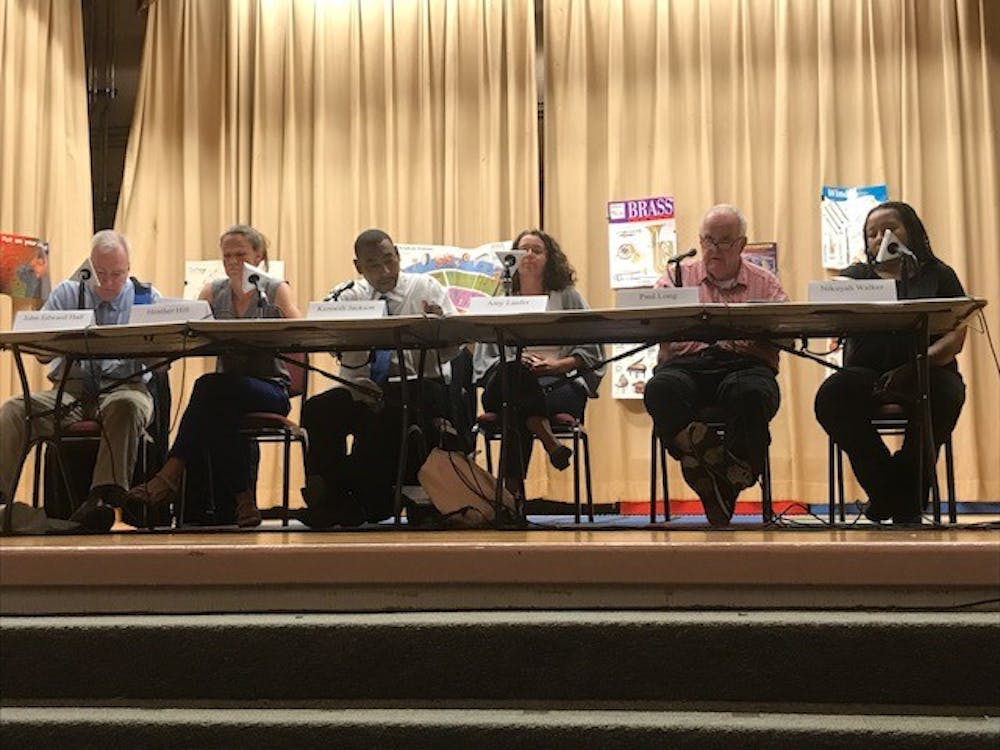Candidates for Charlottesville City Council spoke about a range of issues during a forum held Wednesday night at Johnson Elementary School. The forum was jointly hosted by the Fry’s Spring and Johnson Village neighborhood associations and moderated by Brian Becker, president of the Fry’s Spring Association.
Democrats Heather Hill and Amy Laufer and independents John Edward Hall, Kenneth Jackson, Paul Long and Nikuyah Walker are running for two open seats on City Council. Each candidate was allowed to make a two minute opening statement before being presented with topics and questions from the associations and community members.
The events of Aug.12 and the city’s response to them were prominent features of many candidates’ statements.
Long criticized Mayor Mike Signer and the City Council in relation to their response to Aug.12.
“I think the activities that happened at the Ku Klux Klan rally on Aug. 12 was a disgrace and a breakdown of leadership,” Long said. “I’m researching how to get him [Mayor Signer] removed from office. I don't think he should continue in office, he’s a disgrace.”
Both Hill and Laufer emphasized the need for transparency and accountability.
“We really need to think about the acts of terror that have taken place in our city in recent months that have left our community hurting and all of us seeking answers,” Hill said. “Transparency and accountability and how our city is managed … Could not be more important now. A lot of people, including me, are disappointed in the way leadership has handled recent events.”
“What we saw this summer was really traumatizing,” Laufer said. “Seeing these familiar places … Become scenes of terror, tanks, guns and even death is really traumatic for all of us. And then on top of that, to have our community leaders that we don't understand exactly what their role was … Can add to that trauma. It’s really important that we have leaders that are purposeful and serious on this issue.”
Jackson claimed the events of Aug.12 are distracting the city and community from focusing on more important policy priorities.
“This [Aug.12] is not our City. This is not the way we do things,” Jackson said. “This isn’t Charlottesville and this is not what Charlottesville needs to be known for. We are forgetting the real issues that concern Charlottesville — affordable housing, real jobs [and] fixing up our public housing.”
Walker stated that Aug. 12 shed light upon pre-existing problems of racial inequality in Charlottesville.
“I think after the events of the summer that we finally saw that we had a lot that we needed to discuss, a lot that was ripe and at the surface of things in Charlottesville,” Walker said. “There are a lot of people in Charlottesville that have participated in and upheld the structures that are in place that are causing our city the great difficulties that we are experiencing.”
The candidates also discussed the aftermath of the events of the summer, moving forward after Aug. 12 and the legacy of racism in the Charlottesville community.
Hill reflected upon her experience with diverse communities in Charlottesville, stating that minority voices are underrepresented in local politics.
“It really is about relationship building,” Hill said. “Those voices aren't always being heard … There are so many people that want to be more involved in the process but haven’t found a place for that voice to be heard. We [City Council] have to be the conduit for all your voices to be heard so you can bring your strengths to the table and we can all help our city move together and forward.”
Walker attributed the events of this past summer to an unequal distribution of opportunity in Charlottesville.
“We have to honor people, we have to listen to people and we have to create a government and a city … That is equitable,” Walker said. “I haven’t lived in a city where all people have the ability to thrive and I think that has set the foundation for the events we experienced in Charlottesville over the summer. We haven’t ... As citizens in Charlottesville been willing to have the hard conversations that will force us into change.”
Walker said the community will have to be “open to learning from the challenges” moving forward rather than ignoring them.
“If we want a town that is equitable … That is going to require that we increase our knowledge about why things are and not a history that has been sugar coated,” Walker said.
Jackson, who is black, rejected what he considered to be an excessive focus upon the suffering of African-American people in Charlottesville, claiming that it has prevented them from moving beyond racism.
“We blacks have done so much more than civil rights and slavery,” Jackson said. “This pity party is getting ridiculous … Is that what we think Charlottesville history is about? That we've put people down so bad?”
In closing, Long made a statement on the importance of voting in City Council elections.
“In the 20 years I have been here, in City Council elections, no more than 25 percent of registered voters have voted,” Long said. “This City Council has more effect on your life than ... The president of the United States, which may not quite be true, but I want to to see 80 to 90 percent of the people showing up and voting for City Council.”
Elections for Charlottesville City Council — along with other statewide offices in Virginia including governor — will be held Nov. 7. The deadline to register or update voter registration is Oct. 16 and registered voters can request absentee ballots until Oct. 31.







